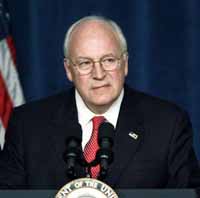Vice president's testimony now uncertain in CIA leak case
Defense attorneys seemed so certain in December when they announced that Vice President Dick Cheney would be called to testify in the CIA leak trial.

Now that prosecutors are close to resting their case against former Cheney aide I. Lewis "Scooter" Libby, however, Libby's attorneys are quietly backing away from that claim. Suddenly, it's unclear whether Cheney or even Libby himself will take the stand.
In documents filed in federal court this week, Libby's attorneys said Cheney was "potentially" a witness. Such hesitation is common but it is a big step back from attorney Theodore Wells' declaration that, "We're calling the vice president" to help defend the former aide against perjury and obstruction charges.
Attorneys appeared even less committed to calling Libby. For months, they said Libby planned to testify and used that assertion fact to get access to a series of classified documents, such as his morning CIA briefing topics, entered into evidence.
"We emphasize at this point that Mr. Libby has not decided whether he will testify," lawyers wrote Monday night.
Special Prosecutor Patrick Fitzgerald has raised the possibility that Libby was promising to testify to win access to classified evidence, then quickly veering away from witness stand.
Libby is charged with lying and obstructing the investigation into the leak of CIA operative Valerie Plame's identity. He says he did not lie but was so bogged down with national security issues that he forgot details about Plame.
Libby originally planned to testify about those national security issues to help bolster what has become known as the "memory defense." Testifying would be a risky move, however, because it would subject him to cross-examination by Fitzgerald, who has a reputation as a tough questioner, reports AP.
Defense attorneys now say they should be allowed to present Libby's calendars and briefing topics even if Libby doesn't testify. Forcing him to take the stand would violate his right to a fair trial and his right against self-incrimination, attorneys wrote.
U.S. District Judge Reggie B. Walton has not ruled on the issue but has said attorneys could not raise the memory defense at closing without Libby's testimony.
"If Mr. Libby doesn't testify, there'll be no memory defense," Walton said.
Subscribe to Pravda.Ru Telegram channel, Facebook, RSS!




